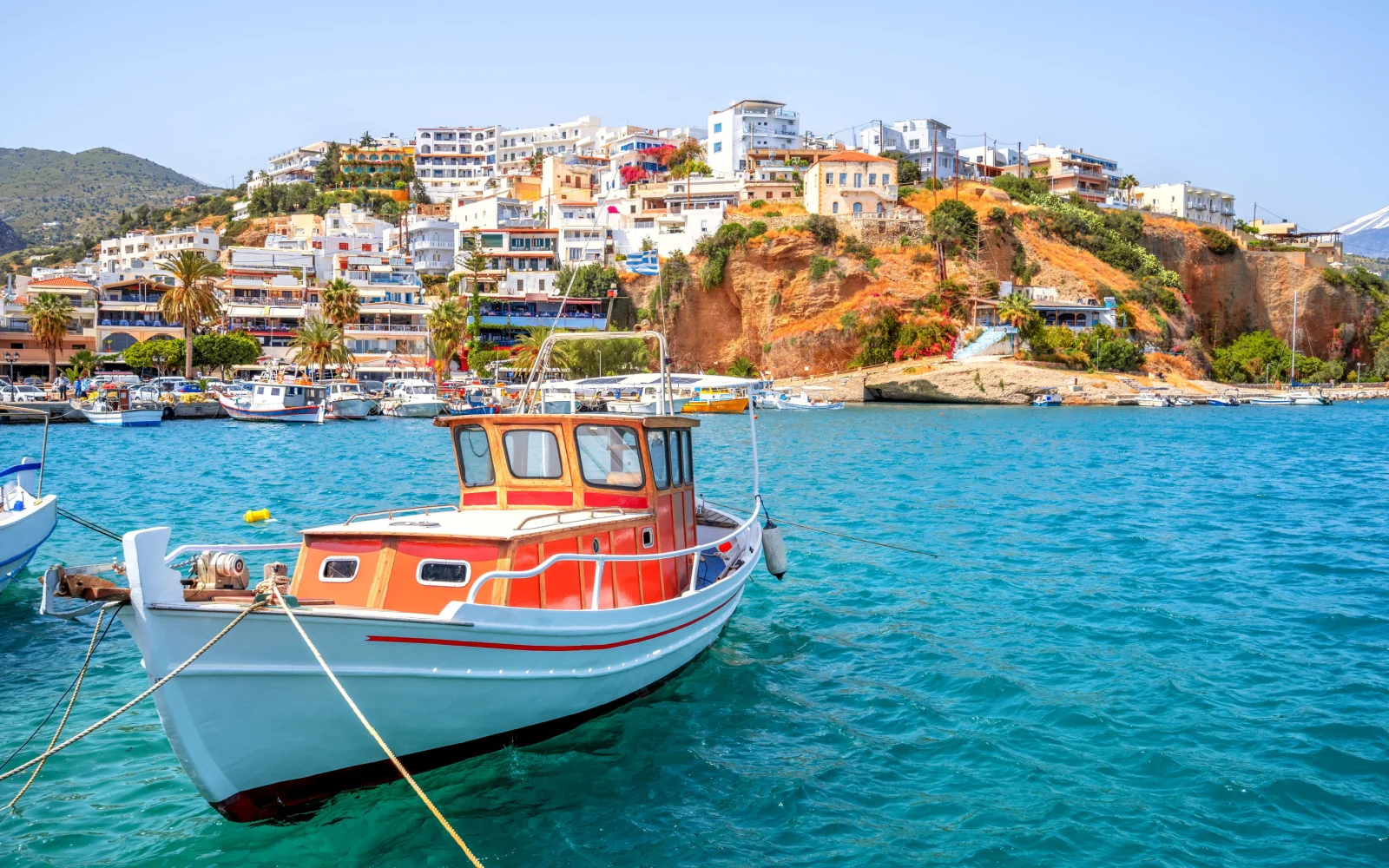What's the best time to visit Greece?
The best time to visit Greece is during the summer months from June to August when the weather is hot and ideal for beach activities. This period also features numerous summer festivals, such as Navy Week, the Hellenic Festival, and Athens Open Air Film Festival. However, this is also peak tourist season, with higher prices and crowded attractions, so be sure to plan ahead.
Whether you’re looking for vibrant nightlife, exploring ancient ruins, enjoying traditional cuisine, or simply basking in the sun on a local beach, Greece has an island and a city for everything.
Some months are better for beachgoing, whereas others are more suitable for sightseeing — which is why the best time to visit Greece will largely depend on what you hope to get out of your journey.
Are you looking to avoid the peak season crowds or take advantage of reduced hotel rates? Perhaps engaging in water-based sports is your number one priority? Read on to get all the Greece-related details. Let us be your guide!
The Overall Best Time to Visit Greece
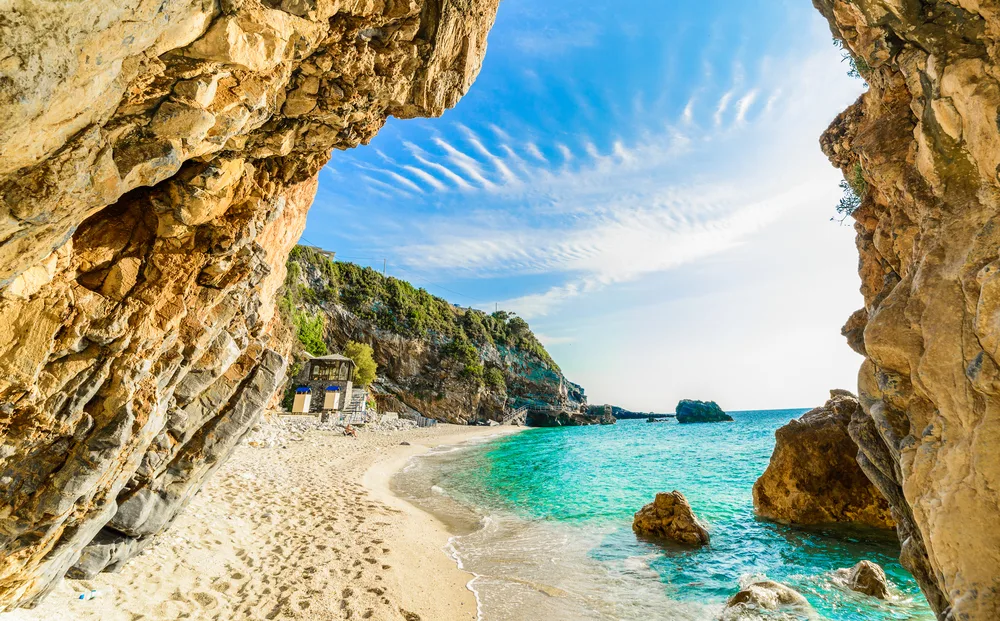
Cristian M Balate/Shutterstock
The overall best time to visit Greece is in summer (June–August), during the country’s peak season.
With temperatures varying between lows of 69°F and highs of 93°F, it’s the prime time to hit the beach, enjoy the country’s hot climate, and attend many fun summer festivals. Parties are at their best, and so is sailing, snorkeling, and island hopping.
Moreover, businesses, tour operators, and ferries work full-time, and tourists flock to the country more than in any other period of the year. Popular summer festivals at this time include Navy Week, just before June ends, honoring the sea.
One of the greatest festivals in the country, the Hellenic Festival (June-August) is known for artistic performances and memorable cultural events.
Then, there’s the Athens Open Air Film Festival (June-September) calling all movie enthusiasts. Yet another popular summer festival, the Kalamata International Dance Festival (July) celebrates music and dance, and the Rockwave Festival (July) focuses specifically on rock.
If you’re in Greece for the famous August Moon Festival, take advantage of the various museums and sites open throughout the night for celebration.
Finally, if you’d like to do some sightseeing and visit ancient ruins, we recommend heading early in the morning, as summer days in Greece can get quite hot.
Also, this is the most expensive time to pay the country a visit, as it’s the absolute peak season — but that’s what makes your stay special, too, as the country is livelier than ever. Make sure to book your stay in advance as well.
Lastly, we suggest sticking to the islands or other typical summer destinations rather than the cities at this time, as they’ll provide you with much-needed relief from the intense summer heat.
Read Next: Why You Should Visit Europe during its shoulder seasons
Cheapest Time to Visit Greece
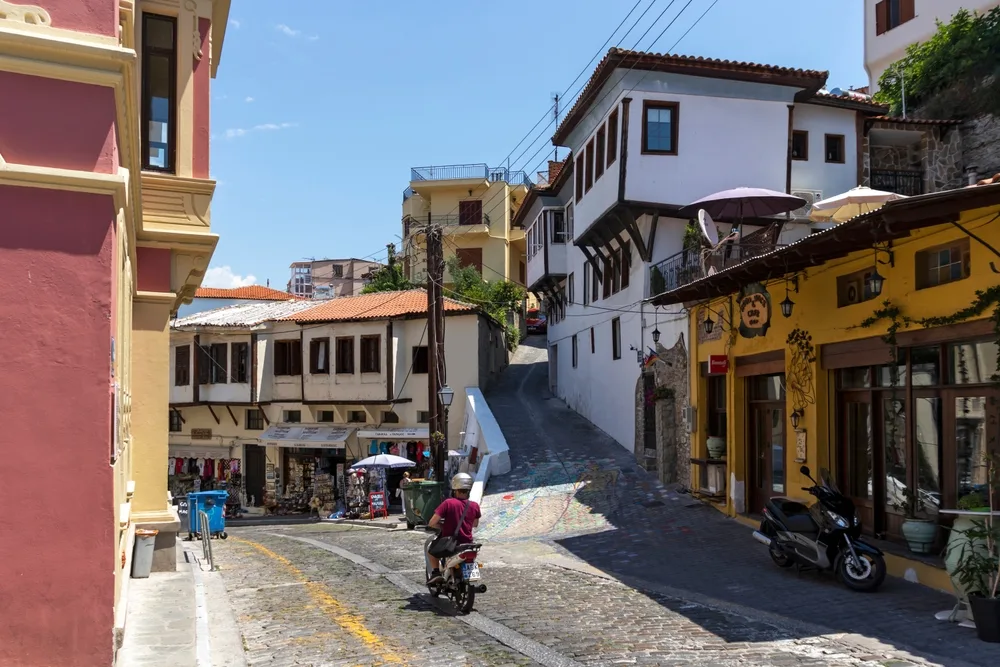
KAVALA, GREECE – JUNE 22, 2019: Typical street and building at Old town of city of Kavala, East Macedonia and Thrace, Greece/Stoyanh/Shutterstock
The cheapest time to visit Greece is in October. It’s the country’s least expensive month, and reduced accommodation rates and airfare deals abound.
The temperatures at this time range between 61°F and 74°F. This mild weather allows visitors to enjoy the changing fall landscape, take advantage of the wine season, and explore the country without having to deal with busy crowds.
The sea does get cooler than usual, though, so engaging in some exciting water sports may be off the table. Still, island hopping is very well possible and may be even better than doing so during the peak season, as you get empty beaches all to yourself.
This month sees the celebration of “Ohi Day,” honoring the Greek defiance of Italian forces during WWII. Accompanied by local delicacies and parades, “Ohi Day” is a must for anyone who finds themselves in Greece on October 28th.
That said, note that although October is the most affordable month to travel to Greece, prices may be inflated around “Ohi Day,” as hotels expect a larger influx of tourists.
Least Busy Time to Visit Greece
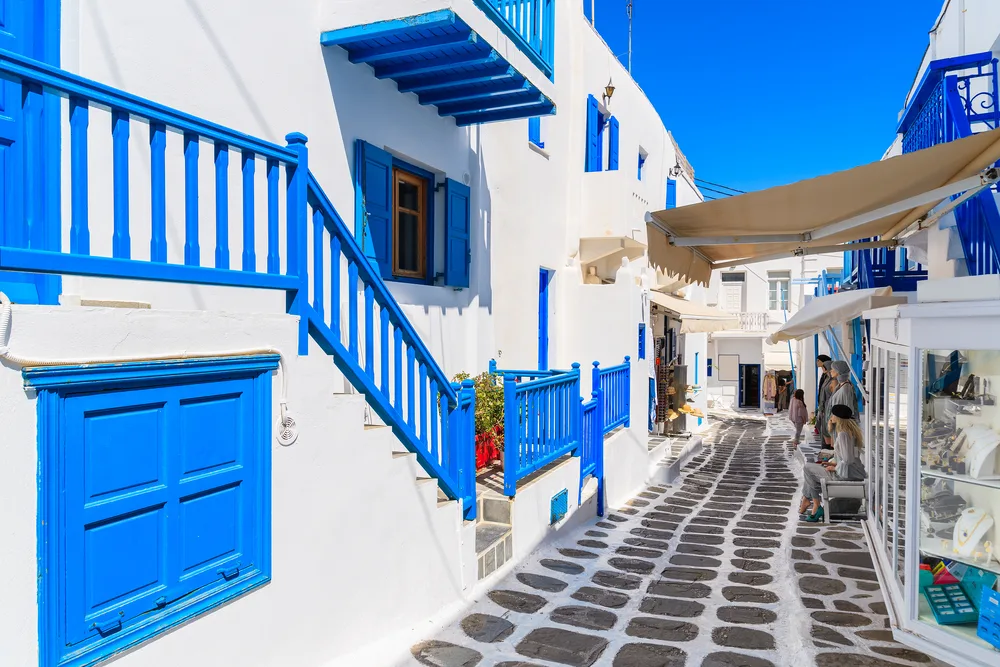
Pawel Kazmierczak/Shutterstock
The least busy time to visit Greece is either in spring (March–May) or in the fall (September–November).
These two seasons are ideal for travelers wanting to steer away from the crowds, engage in active sightseeing, and opt for some dynamic recreational activities, such as hiking, without breaking a sweat.
If you visit in spring, however, expect some crowds around Easter. If you don’t mind them, you’ll be pleasantly surprised by the festivities, traditions, and overall vibe in the country.
Other popular events at that time include the Feast of St. George (April), the Athens International Film Festival (April), and the Athens Jazz Festival (May). Also, note that swimming in spring isn’t quite on the table yet (perhaps in May, the bravest can break the ice).
If you come in the fall, September still has some pretty warm weather, allowing beachgoers to take advantage of the pleasant seawater temperature.
September is also when kids go back to school, so most family vacations come to an end, leaving most Greek islands and cities with very few crowds (if any at all). Spring temperatures fluctuate between 48°F and 77°F.
Next, fall is ideal for wine and olive tasting, so make sure to fully enjoy the harvest season. Also, ferries have more limited work hours as opposed to summer, and the nightlife on most islands isn’t as dynamic once the peak season is off, so keep this in mind while planning your Greek getaway.
Popular festivals in the fall include: the Armata Festival (September), which features artistic events such as theatrical performances, exhibitions, traditional dances, and presentations.
But there’s also the Corfu Beer Festival (September), uniting all beer enthusiasts; the Santorini International Music Festival (September), giving a playful vibe to the island in an otherwise shoulder season; and the Anchialos Wine Festival (September), one of the region’s most celebrated festivals.
If you visit in late fall you can enjoy the Thessaloniki International Film Festival in November and expand your cultural horizons. These fall months welcome travelers with average lows of 53°F and highs of 84°F.
Worst Time to Visit Greece

Brendan van Son/Shutterstock
The worst time to visit Greece (if there is really such a thing) is in the winter (December–February). The weather’s chilly, with temperatures varying between 44°F and 58°F.
The tourist locations are quiet, and the islands aren’t as accessible or inviting.
Moreover, swimming isn’t possible. On the bright side, historical sites remain open, making winter the ideal time for museum hopping, sightseeing, heading to galleries, or simply enjoying a warm drink in a local bar.
Some areas see snow, especially the Meteora and Delphi areas, so expect white landscapes. You also get the chance to experience the country from a local point of view more as opposed to going to any other season.
Note that you can also get heavily reduced entrance fees in ancient sites and state-run museums during this period, allowing for budget-friendly indoor activities to help you deal with Greece’s winter better.
Plus, winter sees some very exciting festivities, such as the Christmas and New Year’s celebrations. If you wish to attend the biggest Christmas market in the country, Oniroupoli, head to the town of Dram.
Another Christmas market worth visiting is Trikala, one of the best Christmas villages in Greece.
The beginning of January sees the celebration of Epiphany by priests blessing bodies of water and locals jumping to obtain a cross — the one who gets the cross is said to have luck and good fortune during the entire year.
February’s Carnival season, or Apokreas, is a must if you enjoy dressing up, parades, nice food, dancing, and entertainment. Next, there’s March 25, annually marked by festivities related to Greek Independence Day, such as parades, music, and traditional costumes.
Frequently Asked Questions
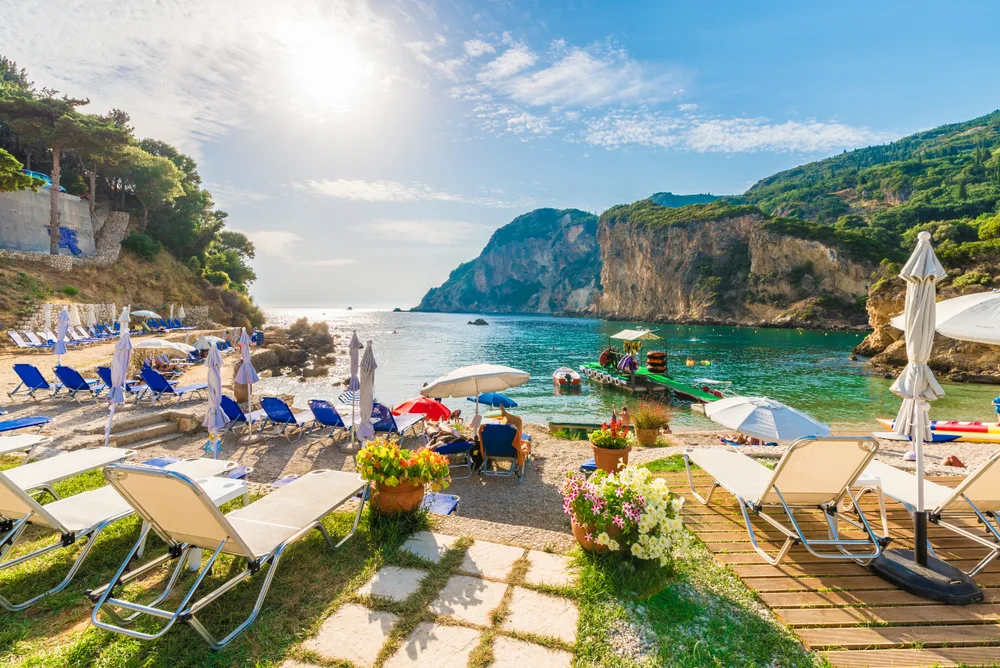
Serenity-H/Shutterstock
How many days do you need in Greece?
There isn’t a straightforward answer to this question. Do you wish to explore major cities and do sightseeing, or are you interested in island hopping? Perhaps staying only on one island? How about attending major festivals?
What part of the year are you planning on going? In general, we suggest staying between 10 and 14 days in the country to truly explore it — the rest is up to your budget, travel preferences, expectations, and travel decisions.
What month does Greece close?
While Greece never really “closes,” it does have shoulder and low seasons, which is basically any season outside of summer, as summers are what makes travelers flock to the country.
Usually, things “wrap up” some time in October, when the last tourist crowds take advantage of the nice weather, reduced hotel rates, and emptyish islands/towns.
Is it expensive to visit Greece?
It all depends on what area in Greece you visit and which part of the year you go there, as peak season periods tend to make accommodation and airfare tickets skyrocket. For instance, if you head to Athens and stay for three days, you’ll need $730 if you’re going alone, $1240 if you’re with a partner, and $1600 if you’re a family of four.
Hotel prices in the city center vary between $170 and $430 (on average, $215 per night). We suggest setting aside $60 per day per person for eating out and transportation.
Last but not least, note that your overall expenses will depend on the Greek region you opt for, the type of accommodation you book, and how you decide to spend your money during your stay. Also, the above-mentioned Athens expenses are based on previous travelers’ experiences, and they’re meant as an estimate and aren’t fixed.
Can you swim in Greece in October?
If the weather permits, then yes, it’s possible to swim in Greece in October. However, just because the weather may still be sunny and the seawater temperature high, this isn’t a given at all times.
To ensure you get the best possible weather conditions, plan your holiday earlier in the year, such as in July or August, during the peak season, or in September, when the weather’s still nice, but the crowds dwindle.
So, When Is the Best Time to Visit Greece?
| 👍 Best Time to Visit | June to August |
| 💲 Cheapest Time to Visit | October |
| 🗓️ Least Busy Time to Visit | March to May or September to October |
| 👎 Worst Time to Visit | December to February |
Overall, the best time to visit Greece is in the summer, from June to August. While it’ll be slightly busier than the shoulder seasons, everything will be open and you’ll experience amazing weather.
And trust us — after going once, Greece’s lively spirit, authentic vibe, hospitality, majestic beaches, and inspiring landmarks will make you begin planning your return trip even before your Mediterranean getaway has finished. Enjoy it!



